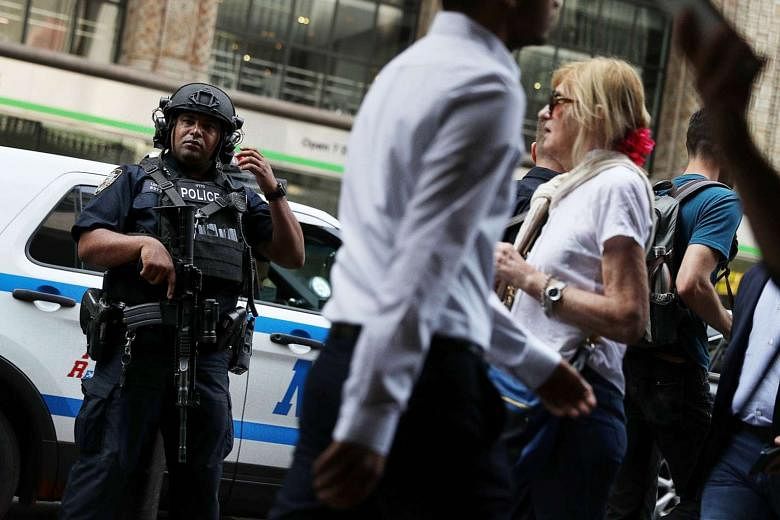WASHINGTON • On Oct 29, 2004, just four days before Americans headed to the voting booth, infamous Al-Qaeda leader Osama bin Laden released a video message warning that his terrorist group was still motivated to launch strikes against the US.
In the video, an apparently healthy Osama - who had by then been pursued by US forces for years - said the Sept 11 attacks were a direct result of US foreign policy and told American voters that their safety was in their own hands.
"Your security is not in the hands of (John) Kerry or (George) Bush or Al-Qaeda. Your security is in your own hands. Any nation that does not attack us will not be attacked."
The video is widely considered as a key disruptive event that ultimately turned the tide in a close race between president George W. Bush and his Democratic Party challenger John Kerry.
The election had up to that point already been dominated by the issues of terrorism and security due to the terror attacks of three years earlier, and initial polling from Newsweek claimed it gave Mr Bush a six-point boost.

Even Mr Kerry blamed the video - now called the "October surprise" - for his loss. "I believe that 9/11 was the central deciding issue in this race," he said in an interview. "We were rising in the polls up until the last day when the tape appeared. We flatlined the day the tape appeared and went down on Monday," he said.
While the extent of the polling bounce Mr Bush received from the video is the subject of some dispute, many still point today to the episode as an indication of how a terror attack, or even the threat of one, can sway an election.
And thus when a bomb went off last weekend in the busy New York neighbourhood of Chelsea, thoughts quickly turned to its impact on the presidential race.
Just like in 2004, national security and terrorism are key issues in this year's campaign. Nationwide polls consistently put security as the second most important issue to voters, just behind jobs and the economy.
The big question then is who the voters will likely turn to as they seek solutions on terror.
TOUGHNESS VS STABILITY
The first part of the answer to the question lies in how voters tend to react to such threats.
Experts generally agree that voters seek toughness and stability in times of fear and uncertainty. A recent study published in the Columbia Journalism Review looked at four elections that took place amid terror fears - Israel in 1996, US and Spain in 2004 and India in 2009 - and concluded that such elections drive people towards leaders who are tough on security. It also said the terror threat tends to favour incumbents.
"One key effect of terrorism on voters is to persuade (them) that moderate political forces are unwilling or unable to stop terrorism," the report said, noting that support for Mr Bush's hardline stance on terrorism might have even boosted how voters viewed his handling of the economy.
Conventional wisdom thus dictates that elections that take place against a backdrop of fear of terrorism tend to favour the more hawkish Republican Party.
Whether that applies to this year's race and Mr Donald Trump is an altogether more complex issue.
On the surface, it does seem like Mr Trump takes a harder line than Mrs Hillary Clinton on the issue of terror, and he certainly produced a more extreme strong-man type response in the wake of the New York bombing. The tycoon did not even wait for the authorities to investigate the explosion before declaring at a rally that it was a bomb. And he followed that up by calling for profiling to stop terrorists entering the US.
"Honestly, whatever it is, but I'm not using the term Muslim. I'm saying you're going to have to profile. We're going to have to start profiling," he said on Fox News.
The underlying theme of his reaction was the same one that penetrates nearly everything the Republican candidate says - that the US has been weak and it needs to get tough.
Mrs Clinton, on the other hand, has been taking a different approach. She criticised Mr Trump for jumping to conclusions before facts were known and said his bluster was a boon for groups like the Islamic State in Iraq and Syria (ISIS). She also argued that she was better equipped to handle the issue.
"I am the only candidate in this race who has been part of the hard decisions to take terrorists off the battlefield," the Democrat said.
In effect, Mr Trump is betting that voters want to see toughness while Mrs Clinton is betting that they want a steady hand. It is not clear who has the winning argument.
Early polls tended to give Mr Trump the edge when it comes to the question of dealing with terrorism, yet, in the past three months, most have tended to give Mrs Clinton a slight lead on the issue.
Mr Trump's many controversial outbursts seem to have negated all the support he might have gained through tough talk and the Republican brand. In fact, some foreign policy experts argue that his tough talk actually makes the country more dangerous.
Mr Matt Olsen, the former National Counterterrorism Centre head, noted in a recent op-ed that some supporters of ISIS were openly advocating for Mr Trump in online message boards because they consider him to be "the perfect enemy".
Similarly, Council on Foreign Relations senior fellow for national security studies Max Boot has called Mr Trump a "dream candidate" for ISIS.
Even if voters were to buy into the bluster and the tough talk that Mr Trump is putting forward, very few can look past his apparently unstable temperament.
A New York Times/CBS poll released last week found that more than two-thirds of voters considered Mr Trump to be the riskier choice for president. In that same poll, Mrs Clinton leads Mr Trump by 49 per cent to 45 per cent on the question of who would do a better job on national security.
Clearly, tough but temperamental is not an ideal combination for a leader in uncertain times.
But that doesn't mean there are many voters who might have otherwise leaned towards the Republican but are now becoming open to Mrs Clinton.
Despite her reputation as one of the more hawkish Democrats, she still has positions that are anathema to the right.
For instance, Mrs Clinton has repeated in recent weeks her commitment to keeping American ground forces out of the conflict in Iraq and Syria. Most polls on the subject, however, indicate that Americans are increasingly supportive of the idea of boots on the ground.
A large majority of Republicans are also against the idea of taking in any refugees from Syria at all, let alone increase the intake from 10,000 to 65,000, like Mrs Clinton has proposed.
That leaves the calculus on terrorism for voters difficult to predict.
But with the current scare taking place days before a major debate, perhaps its bigger impact will be its influence on that platform. The Commission on Presidential Debates has already announced that "securing America" will be one of the three key themes for Monday's face-off and the New York episode will likely drive even more people to tune in.
Otherwise, the nature of both candidates and polarisation among voters would lead one to suspect that the events of the past week will move the needle only marginally rather than being a clear boost for the right.
At a time when voters are likely looking for toughness and stability, it appears that neither candidate can truly offer them both.


